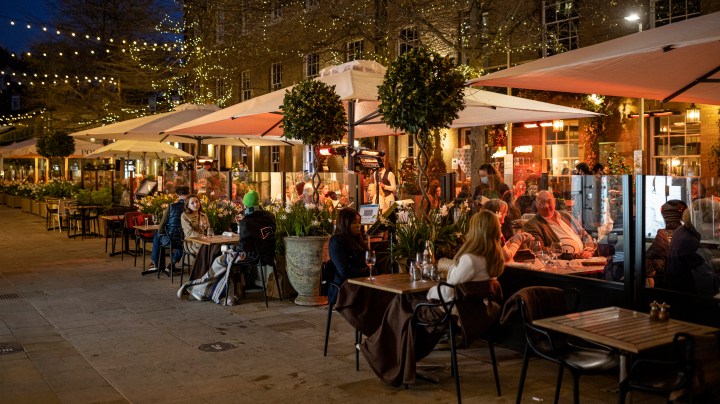
Food businesses across the UK pivot again as crowds return to restaurants, shops
Food businesses across the UK pivot again as crowds return to restaurants, shops

Consumer-facing food businesses changed — seemingly permanently — as a result of the coronavirus pandemic.
With COVID-19 ravaging countries across the world, restaurants, wholesalers and grocery stores had to find new ways to keep people fed and their businesses alive. Instead of welcoming people to tables or into shops, they were sending out everything from gourmet meals to cardboard boxes stuffed full with fresh fruit and veggies.
Now though, things have changed again.
At a refrigerated warehouse on a southeast London industrial estate, wholesale food supplier Smith and Brock is adapting its pandemic-proofed business model for the third time.
“We started a home delivery business, which kind of saved our bacon in 2020, and we’re now looking to expand the wholesale businesses, moving into a new premises,” said Nick Fowler, a co-owner.
When the pandemic first forced people into lockdown two years ago, businesses dried up virtually overnight. With no hotels, restaurants or events to supply, Smith and Brock packed boxes full of fresh produce and delivered them to people all across London. Then, they expanded by partnering with big-name restaurants to offer more customized at-home food experiences.
Fowler and his team called the project Knock Knock, and it became a strand of the business that, a year ago, they intended to make permanent. Now the company is scaling back.
“Just because the demand from lockdown and people going back to restaurants and usual ways of procuring their food has changed. So it’s just not commercially viable anymore,” Fowler said.
This week, Smith and Brock delivered its last Knock Knock box because, as Fowler said in a letter to customers, they “don’t have the deep pockets of private equity, just the back pocket” of his and co-founder/brother Joe’s “ripped jeans.”
What’s more, with the weather getting warmer and COVID restrictions completely rolled back in the United Kingdom, people are itching to return to the easygoing ways of pre-pandemic life.
“People are wanting to go out more than they wanted to pre-pandemic, despite cases still being high,” said Darren Morgan, director of economic statistics at the U.K.’s Office for National Statistics.
He and his team have crunched payment-card data and restaurant reservations from OpenTable. Aggregate spending, their figures show, was up 6% from pre-pandemic levels last week, while restaurant bookings soared 22%.
“What people are telling us is perhaps they’ve reflected during the pandemic, life is too short, they want to make the most of it when they can. They want to go out and eat, and they’ve missed it,” Morgan said.
It’s a trend on full display in east London’s Shoreditch neighborhood. Diners at the Mumbai-style Indian restaurant Dishoom are sipping chai, digging into bowls of black dal and plates of chicken smothered in a rich, red curry sauce.
“One thing that we’re really focused in is creating beautiful restaurant spaces, great experiences for our team, our guests. When the pandemic hit, obviously it was a complete change of events,” said Kavi Thakrar, a co-founder of the chain.
Like so many other restaurants, Dishoom quickly pivoted to at-home deliveries, offering fan favorites like the bacon naan roll, which Thakrar demonstrated how to make in a step-by-step video online.
The offerings were so popular among customers across the U.K. that in addition to meal kits, Dishoom launched hot-food delivery in several cities and expanded its at-home range to include jarred sauces, jams, chai and even cocktails.
Now, when many restaurants are terminating their at-home offerings, Dishoom is moving full-steam ahead in the opposite direction.
“The people who buy our breakfast kits are now trying our grill kits or our feast kits or our biryani kits. I think as a broader market, meal kits have come down, but if I look at the business as a whole, it will, as we add new products and kits, continue to grow because I think people are interested in different routines in their own lives,” he said.
While Dishoom keeps adding, Smith and Brock’s Fowler said his equation isn’t all subtraction.
“Our dad, he was a retail businessman, so he had shops and market stalls and greengrocers and floristry, so it was always something we wanted to do,” Fowler said.
In November, Fowler and his team made the dream a reality, opening the company’s first brick-and-mortar store — called the Market. It offers the same restaurant-quality produce and meat delivery that customers came to enjoy during lockdown.
Another pivot that proves yet again for consumer-facing food businesses, the only constant in a pandemic is change.
There’s a lot happening in the world. Through it all, Marketplace is here for you.
You rely on Marketplace to break down the world’s events and tell you how it affects you in a fact-based, approachable way. We rely on your financial support to keep making that possible.
Your donation today powers the independent journalism that you rely on. For just $5/month, you can help sustain Marketplace so we can keep reporting on the things that matter to you.












